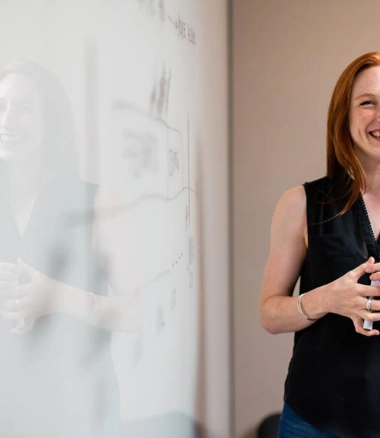
Moving from technical expert to strategic leader is one of the biggest transitions you will make in your career.
In construction, engineering, architecture, and client-side project management, it’s a shift that requires more than delivering technical excellence. It demands a new way of thinking about people, politics, and commercial outcomes — not just projects.
If you’re stepping into your first senior leadership role, here’s what recent data and real-world experience suggest you should know — and how you can use it to lead more effectively.
1. Employers Now Prioritise Strategic Thinking Over Technical Excellence
The 2025 LinkedIn Workplace Learning Report found that critical thinking, decision-making, and leadership are now considered more valuable than technical expertise for senior hires.
If you built your career by being the technical expert, this can feel uncomfortable.
But leadership isn’t about being the smartest person in the room.
It’s about guiding decisions that align technical delivery with commercial realities.
You might want to ask yourself:
- Are you stepping back enough to see how your technical area fits into the wider business strategy?
- Are you making decisions based only on technical perfection — or also considering client expectations, cost pressures, and project risk?
Example:
An experienced structural engineer moving into a regional director role learned quickly that pushing for gold-standard designs without budget awareness caused friction with clients.
When he began aligning technical recommendations with client budgets and timeframes, his influence — and project success rates — grew.
▶ Being technically right isn’t enough. Leaders must be commercially smart.
2. Influence Now Comes from Relationships, Not Just Results
A 2024 Gallup report showed that managers who built strong internal relationships were 38% more effective at delivering complex projects on time and within budget.
You might have built your early career by delivering work to a high standard.
At leadership level, delivery still matters — but your ability to influence across teams and stakeholders becomes the bigger differentiator.
Questions you could consider:
- Are you spending enough time understanding the needs of other departments, clients, and decision-makers?
- Can you build coalitions to support major decisions, rather than relying on authority alone?
Example:
A newly promoted design manager found that while her technical ideas were strong, they stalled without early buy-in from the construction and commercial teams.
She shifted her approach: involving other departments earlier, seeking their input, and addressing their concerns.
Her ideas started getting implemented — not because they were better, but because she had partners across the business.
▶ Relationships create momentum. No senior leader succeeds alone.
3. You Need to Delegate Before You Feel Ready
One of the hardest shifts for new leaders is letting go of technical detail.
Research from McKinsey shows that first-time managers often spend up to 70% of their time on tasks they should be delegating.
If you move into leadership and keep doing the technical work yourself, you bottleneck your team.
Delegation feels risky. But if you wait until it feels safe, you’ll have waited too long.
Questions you could reflect on:
- Are you stepping in because you don't trust your team, or because you haven't developed them yet?
- Are you spending time where you add the most value — or where you're most comfortable?
Example:
A project engineer turned project manager realised he was still rechecking every drawing himself late at night.
Once he invested time upskilling his junior engineers to take more ownership, quality improved — and so did his ability to focus on commercial, client, and programme risks.
▶ Leadership isn’t about knowing everything. It’s about enabling others to deliver.
4. Strategic Leaders Understand and Shape Commercial Outcomes
Employers today expect senior leaders to think commercially.
In the Australian Construction Industry Forum’s 2025 outlook, "commercial acumen" was listed as a top five skill gap for project managers and engineering leaders.
Technical knowledge must now be balanced with:
- Understanding profit margins.
- Managing risk proactively.
- Protecting client relationships for long-term value.
You might ask yourself:
- Do you understand the financial drivers behind your projects?
- Are you thinking ahead about risks that could impact the business — not just the project?
Example:
A client-side project manager saved a $60M residential development by identifying early market risks during the design phase and renegotiating scope before escalation clauses triggered major cost overruns.
It wasn't technical excellence that saved the project — it was commercial foresight.
▶ Leaders are judged by the outcomes they protect, not just the solutions they deliver.
5. Politics Isn’t a Dirty Word — It’s Part of Senior Leadership
New leaders sometimes shy away from internal politics, seeing it as manipulative or unnecessary.
But leadership is political — in the sense that you need to build support, negotiate compromises, and sometimes make pragmatic choices for the greater good.
You might want to reflect:
- Are you aware of who the informal influencers are in your organisation?
- Are you building credibility and alliances — or hoping good work will speak for itself?
Example:
An engineering team lead was technically brilliant but lost a major internal funding decision because he hadn’t consulted other departments early.
The next time, he proactively built cross-team support — and secured not only approval, but additional resources.
▶ Politics, handled ethically, is how you move big ideas forward.
Final Thought
Stepping into leadership means stepping beyond what made you successful so far.
Technical excellence is your foundation — but leadership success is built on relationships, commercial awareness, influence, and strategic thinking.
You don’t need to change who you are.
You need to expand how you think.
If you want to succeed as a senior leader, ask yourself every day:
Am I focusing on technical tasks — or building outcomes through people, strategy, and influence?
Because that’s what your employer, your team, and your future career will measure you by.





